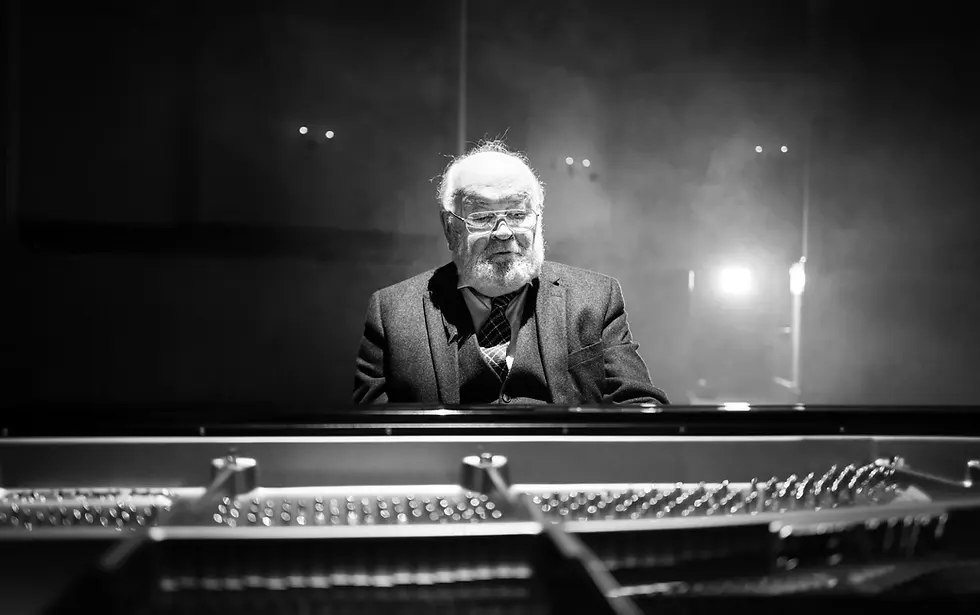David Wilde (1935-2025)
- Blue Pumpkin
- Nov 24, 2025
- 4 min read

The pianist David Wilde died on 23 October 2025. Although I never met him, I owe a great deal to him (as the video explains). See also this blog entry
David Wilde, ‘magnificently berserk’ pianist and composer of The Cellist of Sarajevo
Billed as ‘the 10-year-old Boy Prodigy’, he performed the Grieg Concerto at Blackpool, and broadcast it that year on the BBC
Telegraph Obituaries
12 November 2025
David Wilde, who has died aged 90, was a thoughtful and dazzling pianist, though not one for the faint-hearted; he was also a talented composer, most notably of The Cellist of Sarajevo, a poignant lament made famous in a recording by Yo-Yo Ma.
Delivering on the promise of his surname, his recitals kept audiences on the edge of their seats. Reviews from the 1960s talk of him playing Bartók’s Sonata with “dash and bravado” and giving a “magnificently berserk” account of Liszt’s B minor Sonata. More recently, his third volume of Chopin’s piano music, released in 2015 by Delphian, was described in The Guardian as “a full-on blast of volatile extroversion”.
The Cellist of Sarajevo (1992), with sombre phrases that yearn and mourn while the cellist wails on the top string, came about during the Bosnian civil war. Wilde was inspired by reading of Vedran Smailović, a former cellist with the Sarajevo Opera who played every day outside a bakery in Sarajevo where 22 people were killed by a bomb in May 1992.
It was not Wilde’s only foray into politics. He so admired the Hungarians’ attempted rebellion of 1956 that after a recital there in the early 1960s he played as an encore Liszt’s Funérailles, written in memory of those who fell in the failed revolution of 1848. “Everyone in that Budapest audience knew exactly what I meant,” he told Kate Molleson in The Herald.
More recent interventions include a string quartet concerning the murder in 2016 of the Labour MP Jo Cox. When her widower Brendan suggested it was time to stop mourning and celebrate her work, which would continue, Wilde tried and failed to write a follow-up. “Just look at the state of the world. Her work isn’t going on,” he said. “Maybe I should write a symphony of raspberries and call it ‘Trump’.”
David Wilde was born in Stretford, Greater Manchester, on February 25 1935. At the age of three he made a beeline for his parents’ piano. The family home was bombed in 1940 and they moved to Blackpool, where he enjoyed a busy wartime career as a “boy pianist” playing for servicemen.
This brought him to the attention of the pianist Solomon Cutner, who arranged lessons with his assistant Franz Reizenstein. Billed as “the 10-year-old Boy Prodigy”, he performed the Grieg Concerto at Blackpool. Three months later he broadcast the same work with the BBC Northern Orchestra under Charles Groves.
At 13 he was awarded a scholarship to the Royal Manchester College of Music, where his composition studies with Richard Hall were on an equal footing with his piano lessons with Iso Elinson. By the time he left for National Service in 1951 he was considered the college’s star pianist, but on his return in 1953 that position had been usurped by his friend John Ogdon. But their friendship endured, and in 1974 he effectively sightread Brahms’s Second Piano Concerto at the Proms after the tormented Ogdon had taken an overdose.
For many years Wilde held a dim view of Liszt’s music, saying: “I thought him third-rate.” He revised that opinion in 1961 after coming second to Ogdon in the Liszt Society’s competition in London. More glory beckoned when he shared first prize with the Hungarian pianist Gábor Gabos in the Liszt-Bartók competition in Budapest.
Among the jurors was Nadia Boulanger, who invited him to study with her in Paris. He stayed in a converted attic room above her apartment and “learnt so much about music and about life from her”.
Wilde soon gained a reputation in contemporary circles. “Playing Stockhausen’s Gruppen under Pierre Boulez was a revelation,” he told Gramophone. But it was in the music of Liszt, Chopin and Bartók that he shone brightest, holding Liszt’s Mazeppa Étude and Mephisto Waltz “in a virtuoso’s grip”, noted a Daily Telegraph review in 1962.
By then he was a staff accompanist at the BBC in Glasgow, and that summer made his Proms debut in a fresh-eyed account of Liszt’s First Piano Concerto, returning there on eight occasions. Meanwhile, he recorded all Beethoven’s violin sonatas with the violinist Erich Gruenberg.
Wilde taught in Hanover from 1981 to 2000, after which he settled in Scotland as visiting professor of keyboard studies at the University of Edinburgh. An entire room of his home in Cockenzie, East Lothian, was packed with reel-to-reel recordings of his radio broadcasts. On the mantelpiece stood a metal-and-wood model of a traditional Balkan doorway, presented by the Bosnian government in recognition of his contribution during the siege of Sarajevo.
Wilde had two children from his first marriage. When that ended he undertook Jungian analysis, later applying Jungian theory to Liszt’s B minor Sonata in a paper called Listening to the Shadows. His second wife, Jane Mary, née Davis, died in 2013.
David Wilde, born February 25 1935, died October 23 2025

